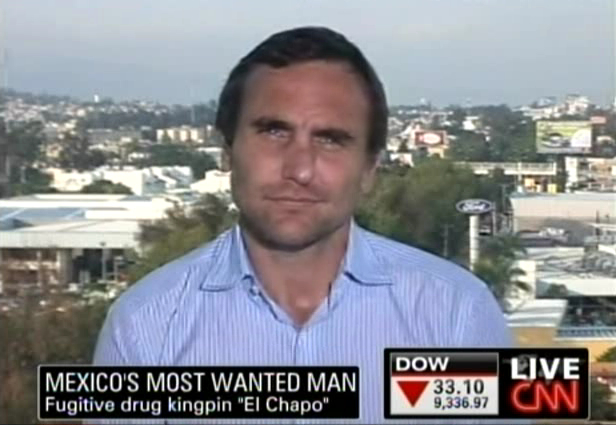NR: "It's Mexican blood that's being spilt."
August 10, 2009

Length: 4:06
LARGE (47.4 MB) ----- SMALL (5.1 MB)
Heidi Collins talks to Michael about the 'Robin Hood' image that 'El Chapo' Guzman is trying to build up in order to hide amongst the people, as well as the fact that America is not putting enough money into the fight against the cartels.
HEIDI COLLINS: President Obama holding talks at the top of the hour with the leaders of Canada and Mexico. The North American summit taking place in Guadalajara is focusing on the fight against swine flu. Plus, regional trade issues and the drug war. Speaking of, the summit is following one of Mexico's deadliest months in fighting drug cartels. One of the most notorious kingpins believed to be in hiding not far from the U.S. border is Joaquin "El Chapo" Guzman. One of the world's richest men, he escaped from a Mexican jail back in 2001. But even on the run, investigators say he still wields power.
(BEGIN VIDEO CLIP)
RALPH REYES, MEXICO AND CENTRAL AMERICA CHIEF, DEA: Chapo is the face. He's the guy who is currently at war against the government of Mexico, against law enforcement and military forces.
(END VIDEO CLIP)
CNN's Michael Ware is joining us now live from Guadalajara with more on El Chapo. So Michael, I understand this guy has some Robin Hood type appeal.
MICHAEL WARE, CNN CORRESPONDENT: Yeah, that's very much correct, Heidi. The Drug Enforcement Agency says that this Robin Hood persona that he has created, this public image comes from work that he does within the community, money that he spreads around the villages and the towns. This, of course, engenders public support. It's a very, very common tactic. We saw Pablo Escobar, the famous Colombian drug lord doing the same thing decades ago. We see the Lebanese militia organization Hezbollah doing that in Lebanon. And in U.S. military parlance, what El Chapo Guzman is doing is winning the hearts and minds of the people around him, which, of course, allows him to hide and to operate, Heidi.
COLLINS: Well, what does the U.S. have to offer in this drug war, Michael?
WARE: Well, that's a really sad answer to a probing question. I mean, America each year is contributing to the drug war here in Mexico approximately half of the personal net worth of El Chapo Guzman himself. "Forbes" magazine says he's worth about $1 billion, just him alone. Yet over three years, America is only contributing about $1.4 billion.
So, we're talking about America in a so-called drug war -- that honestly it's not fighting -- trying to defeat a multi-billion dollar business by throwing just a few hundred million dollars at the problem. Meanwhile, it's Mexican blood that's being spilt, the blood of policemen, the blood of soldiers and the blood too often of innocents on the streets here in a war being waged for the right to supply America the illicit drugs it demands and America, as I said, does not appear to be really putting its heart into this fight, Heidi.
OCLLINS: But is the kingpin not located in Mexico? Are the crimes not happening in Mexico, Michael?
WARE: The crimes are happening across Latin America and North America. You've got American teenagers who are recruited and trained as hit men for the cartels, and they're doing assassinations inside the U.S. The cartels cross the U.S. border and drag their victims back into Mexico.
And it's a regional problem, Heidi. This is what America needs to understand. This is not about the American border. This is a fundamental dynamic that begins in the Andies in South America where there's the production of cocaine. It moves to Central America where you have warehousing and trans-shipments of cocaine, banking in Panama, retail in Mexico, and distribution in the United States. This touches the very streets of the United States, Heidi.
COLLINS: Yeah, clearly a lot of responsibility on both sides of both of these countries. CNN's Michael Ware for us live in Guadalajara this morning, thank you, Michael.
